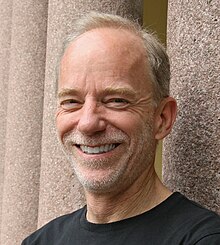Mark Turner (cognitive scientist)
Appearance
Mark Turner | |
|---|---|
 | |
| Born | 1954 (age 69–70) United States |
| Alma mater | University of California, Berkeley |
| Spouse | Megan Whalen Turner |
| Awards | Anneliese Maier Research Prize (Alexander von Humboldt Foundation) (2015); Prix du Rayonnement de la langue et de la littérature françaises (Académie française) (1996) |
| Scientific career | |
| Fields | cognitive science, linguistics, decision-making, reasoning, communication, media, marketing |
| Institutions | Case Western Reserve University |
| Website | markturner |
Mark Turner (born 1954) is a cognitive scientist, linguist, and author. He is Institute Professor and Professor of Cognitive Science at Case Western Reserve University.[1] He has won an Anneliese Maier Research Prize from the Alexander von Humboldt Foundation (2015) and a Grand Prix (Prix du Rayonnement de la langue et de la littérature françaises) from the French Academy (1996) for his work in these fields.[2][3] Turner and Gilles Fauconnier founded the theory of conceptual blending, presented in textbooks and encyclopedias.[4] Turner is also the director of the Cognitive Science Network (CSN)[5] and co-director of the Distributed Little Red Hen Lab.
His wife is the writer Megan Whalen Turner.[6]
Books
[edit]- Death is the Mother of Beauty: Mind, Metaphor, Criticism (University of Chicago Press, 1987)
- More Than Cool Reason: A Field Guide to Poetic Metaphor (with George Lakoff, University of Chicago Press, 1989)
- Reading Minds: The Study of English in the Age of Cognitive Science (Princeton University Press, 1991)
- The Literary Mind: The Origins of Thought and Language (Oxford University Press, 1996)
- Cognitive Dimensions of Social Science: The Way We Think About Politics, Economics, Law, and Society (Oxford University Press, 2001)
- The Way We Think: Conceptual Blending and the Mind's Hidden Complexities (with Gilles Fauconnier, Basic Books, 2002)
- The Artful Mind: Cognitive Science and the Riddle of Human Creativity (Oxford University Press, 2006)
- Clear and Simple as the Truth: Writing Classic Prose Second Edition (with Francis-Noël Thomas, Princeton University Press, 2011) ISBN 978-0-691-14743-7.
- The Origin of Ideas: Blending, Creativity, and the Human Spark (Oxford University Press, 2014)
- Copilots for Linguists: AI, Constructions, and Frames (with Tiago Torrent, Thomas Hoffmann, and Arthur Lorenzi, (Cambridge University Press, 2023)
See also
[edit]- Conceptual blending
- Conceptual metaphor
- Cognitive linguistics
- Cognitive rhetoric
- Cognitive philology
- Metaphor
Notes
[edit]- ^ "Case Department of Cognitive Science: Mark Turner". case.edu.
- ^ Alexander von Humboldt Foundation page for Mark Turner
- ^ "Mark TURNER | Académie française". www.academie-francaise.fr.
- ^ The International Encyclopedia of the Social and Behavioral Sciences. 2001. Edited by Neil Smelser. Elsevier. Pages 2495-2498 ; Croft, William and D. Alan Cruse. 2004. Cognitive Linguistics. Cambridge Textbooks in Linguistics. Cambridge University Press ; Geeraerts, Dirk, editor. 2006. Cognitive Linguistics: Basic Readings. Mouton de Gruyter ; Evans, Vyvyan and Melanie Green. 2006. Cognitive Linguistics: An Introduction. Lawrence Erlbaum Associates ; Harbus, Antonina. 2012. Cognitive Approaches to Old English Poetry. D. S. Brewer.
- ^ "Cognitive Science Network". Archived from the original on October 20, 2008.
- ^ "Megan Whalen Turner - About the Author". meganwhalenturner.org.
